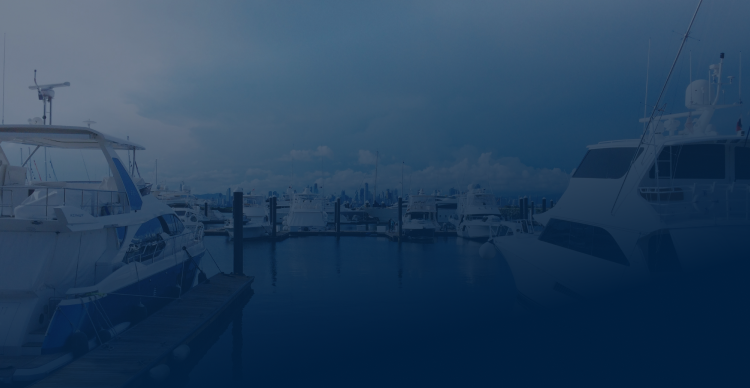fter purchasing a yacht, it is vital that you have insurance for your yacht. There are many different types of yacht insurance, and purchasing yacht insurance will protect you from financial loss due to damage to your yacht. There are many things to keep in mind when picking out yacht insurance. In this guide, we have compiled a list of the types of yacht insurance and things to look out for when buying a yacht to help you make an informed choice when picking yacht insurance.

The importance of yacht insurance
Yacht insurance, as an exclusive type of insurance, fully protects your yacht from all types of risks of damage. Unlike regular standard boat insurance, yacht insurance is geared towards vessels that are larger and of higher value, such as large yachts that are for sale in the market.
Yacht insurance covers a wide range of risks. In terms of liability, it can pay out in the event of bodily injury or property damage to a third party caused by the yacht. In terms of crew protection, it can cover the costs associated with accidents or illnesses incurred by crew members during the course of their employment. Yacht insurance can also cover personal belongings on board if they are damaged or lost due to unforeseen circumstances. A proper policy cover protects the yacht against risks such as damage and theft.
Types of yacht insurance
There are many different forms of yacht insurance, each offering a different level of protection. Understanding these types of insurance can help you pinpoint the right insurance policy for your yacht. Below are the types of yacht insurance:
Liability Insurance
Liability insurance is a fundamental part of yacht insurance, and it covers situations where your yacht may cause damage or injury to a third party. When you're sailing on your yacht or docking at a crowded marina, a little inattention can lead to an accident. Liability insurance ensures that you do not face a legal claim if an accident occurs. This type of insurance covers you against legal costs if you cause injury or damage to someone else while using your yacht, such as crashing into someone else's boat, injuring someone, or causing environmental pollution.
Hull Insurance
Hull insurance provides cover for physical damage to the yacht, covering damage caused by unforeseen events such as collisions, storms and fires. Whether it's a minor scratch or extensive damage, hull insurance will help you cover the cost of repairs or replacement parts. Hull insurance is important for high-end yachts with high prices and complex designs.
Comprehensive Insurance
If you want your yacht to be fully covered, then purchasing comprehensive insurance is ideal. This type of insurance covers a number of different risk scenarios such as theft, vandalism and natural disasters, giving your yacht a wider range of protection against a variety of risks. Comprehensive insurance is often recommended for luxury yachts that are of higher value and face more complex potential risks.
Additional Insurance
In addition to these policies, there are a number of additional insurances available. For example, boat salvage expenses insurance, which helps you cover salvage costs if something happens to your yacht. Crew insurance, which covers the liability associated with hiring a crew. Personal effects insurance, which covers personal belongings on the boat, such as electronics and clothing.
Things to keep in mind when choosing yacht insurance
When you buy a yacht and decide to buy insurance for your yacht, it is important to choose the right insurance. Here are a few things to keep in mind when choosing yacht insurance:
Evaluating Coverage Needs
The first step in purchasing yacht insurance is to assess the need for coverage. The first step is to accurately assess the value of the yacht; high-value yachts require more comprehensive coverage due to their cost and complexity, and the coverage selected should accurately reflect the replacement value of the yacht, taking into account the value of the yacht in the current marketplace and the cost of customization and upgrades. It is also important to be aware of policy exclusions and limitations, for example some policies exclude damage such as wear and tear and mechanical breakdown.
Read the booking instructions
It is also important to read the fine print of your insurance policy carefully. Common policy exclusions are worn and tear, corrosion, and damage due to inadequate maintenance. When purchasing yacht insurance, be clear about deductibles (the amount you will have to pay out of pocket before making a claim; higher deductibles may reduce the premium but increase the cost of making a claim) and limits (the maximum amount that the insurer will pay out; make sure that the limits cover the potential cost of repairing or replacing the yacht).
Customizable strategy
The advantage of yacht insurance is the ability to customize the policy to meet specific needs. Most insurance companies offer customization options that allow you to add additional coverage and expand your coverage. For example, if you are purchasing a yacht to host guests, you can add liability coverage for bodily injury or property damage during the party. The policy can also cover towing, emergency services, personal belongings on board, etc., and a custom policy can provide all-around coverage for matters related to yacht ownership.
Evaluating Insurance Companies
Picking the right insurance company is just as important as determining coverage. Evaluate the insurer's reputation and financial stability; a reputable, financially sound insurer is better able to provide reliable coverage and handle claims efficiently. When selecting an insurer, research the claims process and customer service of the insurer, and refer to reviews and testimonials from other owners of similar yachts to ensure that they provide the best possible service to their clients.



